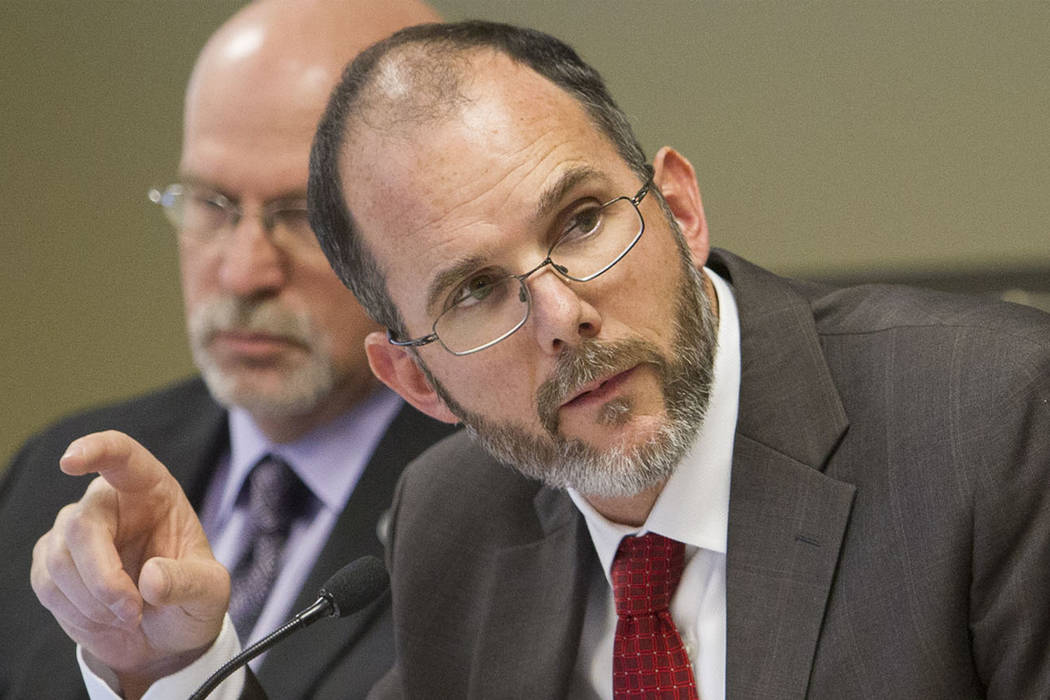Nevada pursues definition of ‘crimes of moral turpitude’
You can’t be a teacher in Nevada if you’ve been convicted of a felony or a “crime of moral turpitude.”
Trouble is, the state has no clear definition of the term “moral turpitude” for state Department of Education officials to use when licensing teachers and other education professionals. A proposed regulation that would specify qualifying crimes aims to change that.
“It’s probably just good common sense a lot of the things that are on there, things we know are wrong,” said Jason Dietrich, the state’s director of educator licensure. “It’s just working the logistics on some of it.”
Moral turpitude, which generally refers to crimes that violate a community’s accepted standards, arises mostly in immigration cases. But even there, case law is unclear, education officials said.
As it stands, defining moral turpitude falls to the state superintendent, Steve Canavero. But the state Education Department began seeking clarity about two years ago, launching the process that led to the draft regulation.
Although not prompted by the rash of recent employee arrests in the Clark County School District — as outlined in the Las Vegas Review-Journal’s recent Broken Trust series — having a clear definition of moral turpitude is needed to help state and district officials pre-empt improper conduct or punish offenders.
In late June, Department of Education officials presented two dozen examples of crimes that they want included on the list to the Legislative Commission. Under their proposal, convictions for burglary, arson, child endangerment, child abuse and anything sexual would be grounds to deny an initial license or a license renewal or to revoke a current license.
In a given year, the department processes between 12,000 and 15,000 license applications and renewals. In the last three years, about 120 applications have been denied.
Lawmaker concerns
While generally supporting the effort to define moral turpitude, the Legislative Commission declined to approve the regulation as presented and returned it to the department for revision.
Concerns included differences in federal and state laws related to controlled substances and immigration charges and deciding how many DUI convictions would be grounds for denial.
Lawmakers zeroed in on marijuana possession convictions, saying they would not want them to result in automatic denials because pot possession is no longer a crime in Nevada.
“We can speak about our intent, but this reads that this could be a basis for a revocation or denial,” said Assembly Speaker Jason Frierson, D-Las Vegas.
Similar concerns were cited about immigration laws. The regulation was written specifically to exclude mentioning immigration crimes, but state Senate President Pro Tempore Mo Denis, D-Las Vegas, said he was concerned that a crime such as harboring a fugitive could open the door for license denial even if it was immigration-related.
Deputy Attorney General Greg Ott, whose agency worked on the proposed regulation with Education Department officials, responded, “My thought is, through conversations with the superintendent, he would certainly take into account what the fugitive had done. If the fugitive was an immigration violation, then that would be something he would look at and exercise his discretion.”
He was referring to a provision of the regulation that would retain the superintendent’s authority to use discretion in individual cases.
Another issue was how many DUI convictions it would take to be denied a license. In Nevada, the first and second DUI convictions are considered misdemeanors. A third conviction is a felony.
The proposed statute would allow one DUI conviction but would generally exclude applicants with two DUI convictions.
“Part of the intent in drafting the language as written was to establish a greater duty of care than might be normal,” said Mike Arakawa, the Education Department’s licensure program officer.
Next steps
Assemblywoman Maggie Carlton, D-Las Vegas, questioned why the regulation was needed, since the existing process seems to be working.
“We do understand that. However, the transparency was not there,” said Dietrich, the state educator licensing official. “It was left up to the interpretation of the sitting superintendent at the time. So as superintendents come and go, this interpretation of moral turpitude could change along the way.”
Legislative Commission staff members are working to draft a formal list of concerns for the Education Department to address in its next revision of the regulation.
Education officials may have to hold another public hearing on the rules, depending on how much lawmaker feedback is incorporated in the next draft. Therefore, they don’t expect to head back to the commission for approval until the fall.
With the number of license applications increasing during the summer — as school districts work through hiring — the department will continue to follow “operating guidelines” from Canavero.
Contact Meghin Delaney at 702-383-0281 or mdelaney@reviewjournal.com. Follow @MeghinDelaney on Twitter.




























